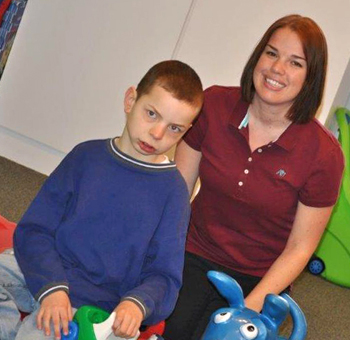
|
Pediatric Occupational, Physical, ABA/Behavioral, Feeding, Speech, and Language Therapies Main Clinic: 931-372-2567 1445 East 10th Street Cookeville, TN 38501 Email: [email protected] HIPAA Secure Email: [email protected] Fax: (931) 372-2572 ABA Clinic: 931-201-9534 400 Dubois Road Cookeville, TN 38501 Email: [email protected] Please call today to get started! Most insurances accepted! |

|
| Who needs therapy? | SE HABLA ESPAÑOL |
Dyspraxia-"Clumsy Child"- Coordination Disorder
What is: Developmental Dyspraxia or Developmental Coordination Disorder?
Dyspraxia can be defined as a neurological disorder beginning in childhood, with difficulties with muscle tone, motor planning and motor coordination as a result of brain messages not being accurately transmitted to the movement system of the body.
Impairements affect a child's activities of daily living (ADL's). These children often have difficulty with visual motor memory as well as fine and gross motor skill delays.
Children with Dyspraxia may have a hard time with remembering instructions, difficulty organizing their time, may lose things often, and have difficulty with activities that are multi-step.
They are often prone to being more sensory overwhelmed and can also have Sensory Modulation Disorder or Sensory Discrimination issues, causing sensory overload or panic attacks.
Difficulty with knowing left vs. right and reversals of letters are common with Dyspraxia.
Population
Research seems to indicate that up to 1 in 20 children suffer from the condition with boys identified four times more frequently than girls. It would therefore seem reasonable to suppose that there is at least one sufferer in each class at school and in special education a much higher ratio.
Neurological Causes
The theory outlined by Gerald Edelman in 1992 suggests that the condition is caused by the failure of the neurons in the brain to develop correctly. This failure of the neurons to form adequate connections means that the brain takes longer to process information and there is a greater likelihood of the brain losing the suggestion and the child therefore failing to respond to requests given to him.
Observable Behaviors
Difficulty with motor milestones such as crawling, walking, first words, skipping, cutting skills, handwriting, reading delays and difficulty with buttoning, zipping, etc.
Behaviors 0 - 3 Years
There are many early indications that a child may have Dyspraxia and a summary is shown below:
-
Irritable and difficult to comfort - from birth
-
Feeding difficulties: food allergies, colic, restricted diet
-
Sleeping difficulties: problems establishing routine, requires constant adult reassurance
-
Delayed early motor development: rolling, difficulty with reciprocal crawling (on belly like army crawl) and creeping (reciprocal on hands and knees like a cat) stage, they prefer walkers and upright standing over belly time
-
High levels of motor activity: constantly moving arms and legs
-
Repetitive behaviors: head banging or rolling
-
Sensitive to high levels of noise
-
Continued problems with development of feeding skills
-
Toilet training may be delayed
-
Avoids constructional toys such as jigsaws and Lego
-
Delayed language development
-
Highly emotional: easily distressed and overwhelmed
-
Concentration limited to 2 or 3 minutes on any task
Treatment is available for this condition: Success has been evident in improved concentration, handwriting, perceptual skills, speed of information processing and motor skills!
Occupational therapy is appropriate for those with handwriting, fine motor, ADL, and self help skill delays!
Physical therapy is for those with gross motor delays and muscle weakness.
Speech therapy is for those with articulation delays, difficulty with communication, and speech issues.
Oral Feeding therapy is appropriate for those with difficulties in chewing, swallowing, and handling food textures.
Contact Center of Development Pediatric Therapies to learn more about our awesome therapies for amazing kids!
Neuro-visual therapy is for those with eye muscle issues, difficulty with visual focusing, reading delays, letter reversals, and visual attention issues. Contact Center of Vision at 931-372-2020 to learn more about neuro-visual therapies for Dyspraxia!
Site empowered by
WebOnTheFly